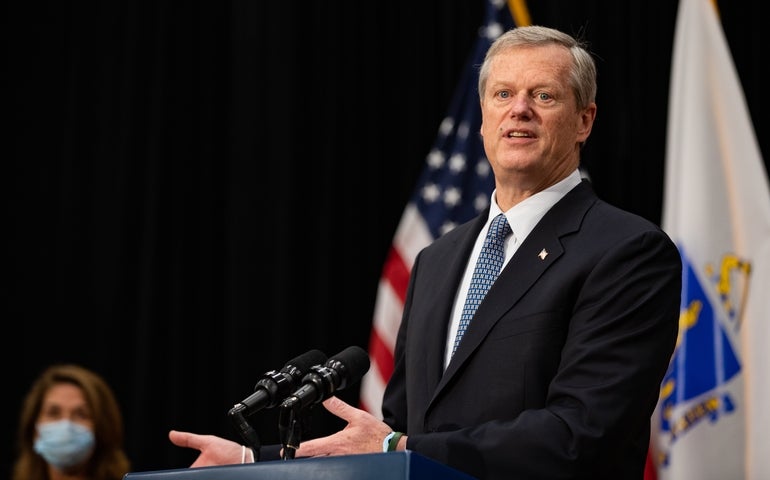Massachusetts businesses would face smaller increases in taxes they pay to fund the state unemployment system over the next two years, under a new bill Gov. Charlie Baker announced on Friday.
With the state facing an unprecedented surge in demand for joblessness aid during the COVID-19 pandemic, the unemployment insurance trust fund is already in the red and relying on billions of dollars borrowed from the federal government to keep jobless aid flowing.
Baker’s legislation, which does no yet have a bill number, would freeze the rates employers must pay at their current schedule, replacing a nearly 60 percent increase in the average per-employee cost in 2021 with a more modest increase of about 17 percent.
Business leaders have fretted about the impending hikes for months, warning that they would struggle to hire more workers — particularly if the economy remains on shaky ground in early 2021 — if they had to pay significantly more toward the unemployment fund.
The governor’s bill would also enable the state to issue bonds to pay back federal loans that have helped keep the unemployment insurance trust fund solvent, a step that Baker said will reduce the cost Massachusetts pays in the long run and guarantee benefits without hamstringing businesses.
“The fact that it’s so much less expensive means people get their benefits that they’re entitled to and employers, in the midst of a terrible, terrible time for so many of them, continue to pay what they pay now and don’t get a big quarterly increase that could be hundreds of dollars per employee,” Baker said.
Like many states across the country, Massachusetts has been hit with a deluge of unemployment claims since the pandemic hit and prompted widespread business closures in March.
Over the first 10 months of 2020, the state’s unemployment insurance trust fund paid out more than $5.3 billion in benefits, nearly five times as much as during the same span in 2019, according to a report summarizing the trust fund.
The Executive Office of Labor and Workforce Development estimated the trust fund will end the year with a deficit of nearly $2.4 billion, which could swell to almost $4.8 billion by the end of 2021.
In its most recent quarterly report issued in October, the administration projected the shortfall will trigger a change in the contribution rate from schedule E to schedule G for employers, pushing the average cost per employee from $544 this year to $866 next year.
Under Baker’s bill, the employer tax rate would remain at schedule E in 2021 and 2022 rather than jump up to schedule G, as would be required under current law.
That change would limit the per-employee costs to $635 in 2021 and $665 in 2022, according to Baker’s office, providing a smaller increase that the administration described as $1.3 billion in unemployment insurance rate relief.
Baker urged lawmakers to make the suggested unemployment reform a priority amid the leadership scramble set off by House Speaker Robert DeLeo’s apparent impending departure.
“We could do this in January or February or March, but if you want to send a really big and positive signal to employees and to people who are out of work and to employers, this would be an incredibly positive message to send because it limits the increase in unemployment exposure to workers and it also limits the hit financially that would be associated with employers come January,” Baker said.
Baker filed the bill on the same day that labor officials announced that the Massachusetts unemployment rate dropped 0.7 percentage points to 6.7 percent in November, mirroring the national rate.
Despite that improvement, however, less than half of the jobs lost at the start of the crisis have been restored, and thousands of laid-off workers in Massachusetts still depend on unemployment benefits to help them pay rent or put food on the table during the public health emergency.
With the need for more unemployment aid outpacing money brought into the system, the state has had to rely in recent months on the federal government.
Massachusetts has received more than $2.2 billion in federal loans for its unemployment insurance trust fund as of Thursday, according to federal data, the fifth-most of any state behind California, New York, Texas and Illinois.
Those advances will accrue interest at a rate of 2.4 percent starting next year.
Baker’s bill would also authorize the state to issue special obligation bonds to repay money borrowed from the federal government, supported by an unemployment obligation assessment. The governor said Friday that private interest rates are lower and offer a better payment schedule than borrowing from the federal government.
Another section of the bill would create a surcharge on employers to help repay interest on the federal advances, which will be due starting in fall 2021 and cannot be paid directly from the unemployment insurance trust fund.
It was not immediately clear how much the surcharge would total.
The hike is also scheduled to take effect alongside two other substantial cost increases: worker access to paid family and medical leave and a $0.75 increase in the minimum wage to $13.50 per hour.
Beacon Hill leaders on several occasions, including during the Great Recession, agreed to freeze the unemployment insurance rates that employers pay. Sen. Patricia Jehlen, who co-chairs the Labor and Workforce Development Committee, said in September that another such action is likely.
“Traditionally, and I think we would want to do this again, we would need to freeze,” Jehlen said at the time. “We would love to freeze rather than allowing it to go up during a recovery because so many businesses are in trouble. But we really need help from the feds to make that possible.”

